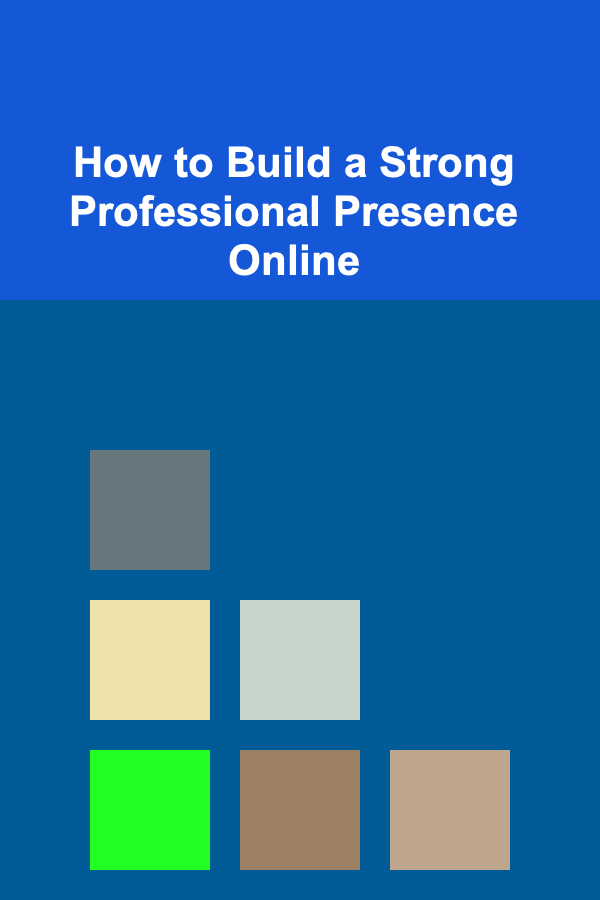
How to Build a Strong Professional Presence Online
ebook include PDF & Audio bundle (Micro Guide)
$12.99$10.99
Limited Time Offer! Order within the next:

In today's digital age, building a strong professional presence online has become a critical aspect of career development. Whether you're a seasoned professional, an entrepreneur, or just starting out in your field, your online presence can significantly influence how you're perceived by potential employers, collaborators, and clients. A well-crafted online presence not only increases your visibility but also establishes your credibility, authority, and expertise in your area of work.
Building a strong professional presence online isn't just about having a LinkedIn profile or a personal website. It's about strategically curating your online activities, consistently showcasing your skills and experiences, and engaging with others in meaningful ways. This article explores the steps, strategies, and best practices for building and maintaining a professional online presence that sets you apart in your field.
Understanding the Importance of Online Presence
Before diving into the specifics of building a professional online presence, it's important to understand why it matters. The internet is now the first place people go when searching for someone. Whether you're seeking a new job, business opportunities, or trying to build your network, your online presence is often the first impression people have of you.
Here are some key reasons why a strong online presence matters:
- First Impressions: Your online presence is often the first point of contact with potential employers or collaborators. It's crucial to make a good impression.
- Networking Opportunities: A strong online presence allows you to network with peers, thought leaders, and industry influencers.
- Credibility and Trust: Consistently sharing valuable content and insights demonstrates your expertise and helps build trust with your audience.
- Career Advancement: A solid online profile can make you more visible to recruiters and hiring managers. It can also open doors to career advancement opportunities.
By understanding these points, you can see that your online presence isn't just a vanity project but an essential career asset.
Building the Foundations of Your Online Presence
The foundation of any professional online presence lies in creating a cohesive, polished, and professional digital footprint. This involves several key components: creating a personal website, optimizing your LinkedIn profile, and choosing the right platforms for your niche. Here are the essential steps to take:
2.1. Establish a Personal Website
While social media platforms like LinkedIn are great for professional networking, having your own personal website gives you full control over your online presence. A personal website allows you to showcase your portfolio, achievements, and personality in ways that other platforms may limit.
A personal website should typically include:
- Homepage: A brief introduction about who you are, what you do, and your mission. Keep it professional and approachable.
- Portfolio: A showcase of your work, whether it's writing, design, coding, or other professional projects.
- About Page: A more in-depth look at your background, education, and work history.
- Blog: If relevant, a blog can be a great way to share your insights on industry trends, career advice, or personal experiences. Regularly updated blogs can help establish your authority in your field.
- Contact Information: Make it easy for people to reach out to you. Provide email addresses, phone numbers, or social media links.
2.2. Optimize Your LinkedIn Profile
LinkedIn is one of the most powerful tools for building a professional presence online. It's a platform where potential employers and collaborators actively search for talent. Here's how to optimize your LinkedIn profile:
- Professional Headshot: Choose a high-quality, professional photo that conveys your personality but also matches the tone of your industry.
- Headline: Your LinkedIn headline should capture who you are and what you do in a few compelling words. Avoid generic titles like "Consultant" or "Manager" and opt for something specific like "Marketing Strategist Helping Brands Connect with Millennial Audiences."
- Summary: Write a concise and engaging summary that highlights your skills, accomplishments, and what you're passionate about. Use this section to tell your story.
- Experience: List your professional experiences, including any notable projects, leadership roles, or key accomplishments. Tailor your experience section to align with your career goals.
- Skills and Endorsements: Add key skills that are relevant to your industry and encourage colleagues or clients to endorse you. Skills with multiple endorsements increase credibility.
- Recommendations: Ask for recommendations from colleagues, supervisors, and clients who can speak to your professional skills and character. A strong recommendation can set you apart from others.
2.3. Choose the Right Social Media Platforms
While LinkedIn is the most professional social platform, depending on your industry, other platforms may be more effective for building your presence. Consider the following:
- Twitter: If you're in tech, journalism, marketing, or politics, Twitter is a great platform to share your thoughts, network with industry leaders, and stay updated on trends.
- Instagram: For creatives, visual artists, or anyone in the fashion and design industries, Instagram is an excellent platform to showcase your portfolio.
- YouTube: Video content can be a powerful tool for building a professional online presence. Creating video tutorials, presentations, or even thought leadership videos can help establish your authority.
- Medium: If you love writing, Medium is an excellent platform for sharing articles, insights, and thought leadership pieces with a larger audience.
Choosing the right platforms depends on where your target audience is most active. Once you've identified these platforms, ensure that your profile on each one is consistent, professional, and aligns with the image you want to project.
Content Creation: Sharing Your Expertise
A professional online presence isn't just about your profile or website; it's also about the content you share. Regularly creating and sharing content helps establish your expertise and keeps you visible in your industry. Here are some content strategies to help you build a strong presence:
3.1. Start a Blog
Writing a blog is an excellent way to share your knowledge, opinions, and insights. By consistently publishing blog posts on topics relevant to your industry, you can demonstrate your expertise and attract a following.
- Focus on Value: Always focus on creating content that provides value to your audience. Whether it's offering industry insights, solving common problems, or sharing lessons learned, make sure your blog content is helpful and informative.
- Stay Consistent: Post regularly. Whether it's once a week or once a month, consistency is key to keeping your audience engaged.
- Optimize for SEO: If you want to attract more visitors to your blog, focus on search engine optimization (SEO). Use relevant keywords, create shareable content, and optimize your blog for mobile viewing.
3.2. Share Industry News and Insights
In addition to writing original content, share relevant industry news and insights on your social media platforms. By curating and sharing high-quality content from thought leaders and experts, you can position yourself as a well-informed professional who stays on top of industry trends.
3.3. Create Thought Leadership Content
To build a strong professional presence, aim to position yourself as a thought leader in your field. Thought leadership content goes beyond just sharing insights---it provides new perspectives, innovative ideas, and valuable lessons that can help others in your industry.
- Write Long-Form Articles: Platforms like LinkedIn and Medium are ideal for publishing long-form articles. Share your unique perspective on important industry issues, trends, or challenges.
- Host Webinars or Live Sessions: Engaging with your audience in real-time through webinars, podcasts, or live streams is an excellent way to showcase your knowledge and build a community.
3.4. Collaborate with Others
Guest blogging, podcasts, or co-authoring articles with other industry professionals can help you build your authority and expand your network. Collaborating with others allows you to tap into new audiences and benefit from the credibility of established professionals.
Networking: Building Relationships Online
Networking is a crucial part of building a professional online presence. However, it's not just about collecting connections on LinkedIn; it's about forming meaningful, genuine relationships with others in your industry. Here's how to do it:
4.1. Engage with Others' Content
Engaging with others' content is a great way to start building relationships. Like, comment, and share posts from industry leaders and peers to show that you're active and interested in the topics they're discussing.
- Leave Thoughtful Comments: When commenting on someone's post, make sure your comment adds value to the conversation. Share your thoughts, ask questions, or offer additional insights.
- Share and Credit: Sharing others' content shows that you support their work and helps expand your network.
4.2. Join Online Communities and Forums
Participating in online communities and forums is an excellent way to meet people in your field, ask questions, and share your knowledge. Platforms like Reddit, Slack, and industry-specific forums can help you connect with others and stay updated on industry trends.
4.3. Attend Virtual Events and Conferences
Many professional conferences and networking events have moved online. Virtual events provide a unique opportunity to learn from experts, interact with other attendees, and expand your network---all from the comfort of your home.
- Participate Actively: When attending virtual events, be an active participant. Ask questions, contribute to discussions, and connect with speakers and attendees.
Maintaining Consistency and Authenticity
Building a professional online presence is an ongoing process that requires consistency and authenticity. It's not enough to simply set up profiles and post a few times. To maintain a strong online presence, follow these best practices:
5.1. Be Consistent Across Platforms
Your professional presence should be consistent across all platforms, from your LinkedIn profile to your personal website. This consistency builds trust and makes it easier for people to recognize you and your work.
5.2. Be Authentic
Authenticity is key to building meaningful connections online. Don't try to be someone you're not. Instead, focus on being genuine and transparent in your interactions.
- Show Personality: It's okay to let your personality shine through in your content and interactions. Authenticity helps build trust with your audience.
5.3. Regularly Update Your Profiles
Your professional journey is always evolving, so make sure to update your online profiles regularly to reflect your latest accomplishments, skills, and experiences. This keeps your online presence fresh and relevant.
Conclusion
Building a strong professional presence online takes time, effort, and strategy. By establishing a personal website, optimizing your social media profiles, creating valuable content, and networking with others, you can develop an online presence that opens doors to new opportunities and positions you as an authority in your field.
Remember that consistency and authenticity are key to maintaining your online presence. Stay engaged, keep learning, and always focus on providing value to your audience. With the right approach, your online presence will become a powerful tool for advancing your career and achieving your professional goals.

How to Handle Lease Renewals for Your Home Rental Property
Read More
How to Host a Swap Meet for Your Hobby Items
Read More
How to Invest in Real Estate with Little or No Money Down
Read More
Mastering Account Management: Essential Skills for Success in Client Services
Read More
How to Build a Strong Acting Resume with Limited Experience
Read More
10 Tips for Volunteering on an Archaeological Dig
Read MoreOther Products

How to Handle Lease Renewals for Your Home Rental Property
Read More
How to Host a Swap Meet for Your Hobby Items
Read More
How to Invest in Real Estate with Little or No Money Down
Read More
Mastering Account Management: Essential Skills for Success in Client Services
Read More
How to Build a Strong Acting Resume with Limited Experience
Read More